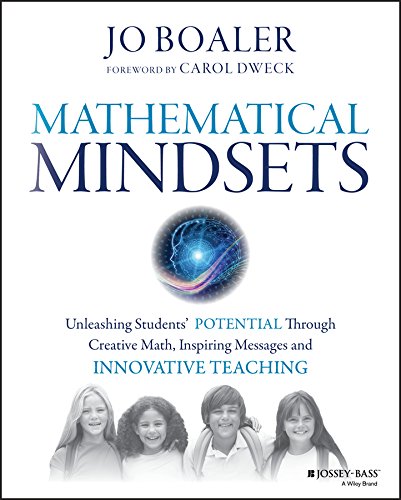Mathematical Mindsets: Unleashing Students’ Potential through Creative Math, Inspiring Messages and Innovative Teaching Link to heading
Summary Link to heading
“Mathematical Mindsets,” authored by Jo Boaler, explores the power of mindset in learning mathematics. It challenges traditional approaches to math education that often emphasize rote memorization and speed. Instead, Boaler advocates for a dynamic, growth-oriented teaching method that encourages creativity, collaboration, and real-world problem solving. The book delves into educational psychology, showcasing how fostering a growth mindset can empower students and radically shift their mathematical experiences and outcomes. It includes research-based strategies and classroom examples to demonstrate how educators can transform their teaching practices.
Review Link to heading
“Mathematical Mindsets” has been widely praised for its innovative approach to math education and its potential to motivate both teachers and students. One of its significant strengths is Boaler’s use of empirical research to support her insights, providing a solid foundation for practical recommendations. The book is also lauded for its engaging, accessible writing style, making complex educational theories understandable. However, some critiques point to the potential lack of depth in addressing the challenges of implementing such changes in diverse educational environments. Overall, the book is a valuable resource for educators seeking to inspire a love of math in their students.
Key Takeaways Link to heading
- Growth Mindset: Emphasizing the belief that mathematical ability is not fixed but can be developed through effort and learning from mistakes.
- Creative Problem Solving: Encouraging students to view math as an open, creative field rather than a series of procedural tasks.
- The Role of Mistakes: Highlighting mistakes as valuable learning opportunities instead of elements of failure, fostering a healthier learning environment.
- Collaborative Learning: Promoting cooperative learning techniques where students learn from one another in group settings.
- Real-World Applications: Connecting math education to real-life situations to make it more relevant and engaging for students.
Recommendation Link to heading
“Mathematical Mindsets” is particularly beneficial for educators, administrators, and policymakers seeking to revolutionize their approach to teaching mathematics. It offers valuable insights for those interested in integrating growth mindset principles in their classroom to enhance student motivation and achievement. Additionally, parents of school-aged children could find the strategies discussed useful for supporting positive math experiences at home. Overall, it is a compelling read for anyone committed to transforming math anxiety into math enthusiasm.
